Toyota Sienna Service Manual: Inspection
1. INSPECT CHARCOAL CANISTER ASSEMBLY
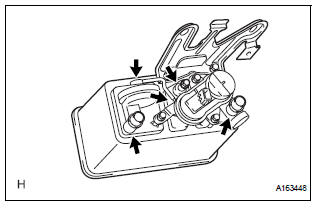
(a) Visually check the charcoal canister for cracks or damage.
If cracks or damage are found, replace the charcoal canister assembly.
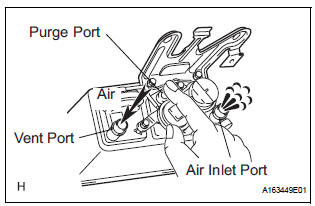
(b) Check charcoal canister operation.
(1) With the purge port closed, blow 1.67 kPa (17.0 gf/cm2, 0.24 psi) of air into the vent port, and check that air flows from the air inlet port.
If the result is not as specified, replace the charcoal canister assembly.
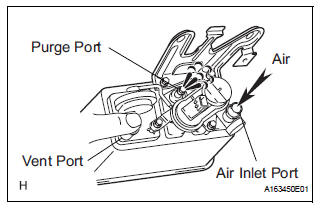
(2) With the vent port closed, blow 1.10 kPa (11.2 gf/cm2, 0.16 psi) of air to the air inlet port, and check that air flows from the purge port.
If the result is not as specified, replace the charcoal canister assembly.
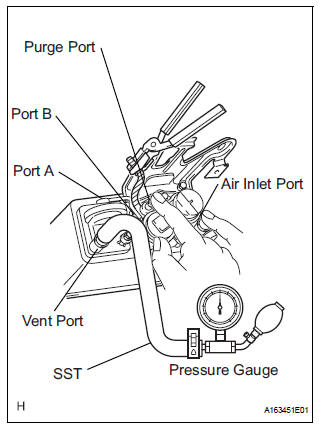
(c) Check for air leakage.
(1) Remove the air hose between ports A and B.
(2) Connect SST (pressure gauge) to the vent port of the charcoal canister.
SST 09992-00242 (3) While holding port B, with the purge port and the air inlet port closed and port A open, apply 19.6 kPa (0.2 kgf/cm2, 2.81 psi) of pressurized air into the vent port, then confirm that pressure is retained for 1 minute.
If the result is not as specified, replace the charcoal canister assembly.
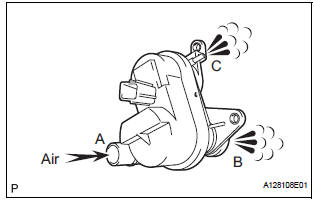
(d) Check the leak detection pump.
(1) Remove the detection pump from the charcoal canister.
(2) Check that air flows from port A to B and then C.
If the result is not as specified, replace the charcoal canister assembly.
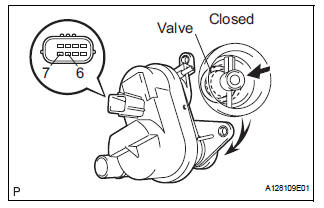
(3) Connect the positive (+) lead to terminal 7 and the negative (-) lead to terminal 6.
(4) Check that the valve is closed.
If the result is not as specified, replace the charcoal canister assembly.
(5) Install the detection pump.
 Removal
Removal
1. REMOVE CHARCOAL CANISTER PROTECTOR
(a) Remove the 6 bolts and charcoal canister protector.
2. REMOVE CHARCOAL CANISTER ASSEMBLY
(a) Disconnect the fuel tank vent hose from the
charcoal cani ...
 Installation
Installation
1. INSTALL CHARCOAL CANISTER ASSEMBLY
(a) Install the 3 bolts and charcoal canister.
Torque: 29 N*m (296 kgf*cm, 21 ft.*lbf)
(b) Connect the purge line hose to the charcoal
canister.
(c) ...
Other materials:
Installation
1. INSTALL FRONT SEAT ASSEMBLY LH
Place the seat assembly in the cabin.
NOTICE:
Be careful not to damage the body.
Connect the connectors under the seat assembly.
Tighten the 2 bolts on the front side of the seat
assembly.
Torque: 37 N*m (375 kgf*cm, 27 ft.*lb ...
Cooling fan relay
On-vehicle inspection
1. Cooling fan relay
(a) Remove the relay from engine room relay block No.
1.
(b) Measure the resistance of the relay.
Standard resistance
If the result is not as specified, replace the cooling
fan relay.
(c) Install the relay to engine room relay block No. ...
Diagnosis system
1. DESCRIPTION
(a) When troubleshooting OBD II vehicles, the only
difference from the usual troubleshooting procedure
is to connect an OBD II scan tool complying with
SAE J1987 or a intelligent tester to the vehicle, and
read off various data output from the vehicle's ECM.
(b) OBD II reg ...
